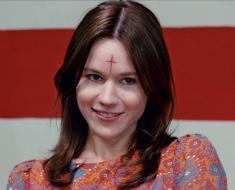Legendary queer American filmmaker John Waters has expressed his displeasure over the creation and release of the low-budget Canadian feature Leslie, My Name Is Evil, which opens this Friday.
The film depicts one of the Manson trials in an entirely unrealistic style and, in particular, focuses on the infatuation one juror had with Leslie Van Houten, one of Manson’s followers who was charged with murder.
Waters has recently been on a campaign to see Van Houten, now 61 and still incarcerated in a California prison, paroled. In an email response to Xtra, Waters wrote, “Both myself and Leslie were horrified this movie was made, and I will never be able to watch it no matter what the intent.”
In a series of five articles Waters wrote for The Huffington Post last year, he stated “I have a really good friend who was convicted of killing two innocent people when she was 19 years old on a horrible night of 1969 cult madness… Her name is Leslie Van Houten and I think you would like her as much as I do… she looks back from prison on her involvement… in utter horror, shame and guilt and takes full responsibility for her part in the crimes.” The articles are excerpts from a forthcoming book by Waters, Role Models.
But perhaps even more fascinating for hardcore Waters fans will be his mea culpa — Waters expresses regrets about his repeated comic references to the Manson crimes in his films (several of his films were dedicated to Manson family members). “I am guilty, too,” he writes, without any apparent irony. “Guilty of using the Manson murders in a jokey, smart-ass way in my earlier films without the slightest feeling for the victims’ families or the lives of the brainwashed Manson killer kids who were also victims in this sad and terrible case.”
The film’s writer/director, Toronto’s Reg Harkema, expressed surprise at Waters’ reaction to the feature. “It’s a bittersweet honour to have shocked and outraged the king of shock and outrage. And by a straight filmmaker, no less.”
Waters’ condemnation may actually bring some added publicity to the feature. This is, after all, a man many credit with having made some of the most offensive films in cinematic history, saying he’s offended by a film. But it’s also too bad he refuses to check it out. Leslie, My Name Is Evil is by no means either a glorification or vilification of Leslie Van Houten or any of Manson’s followers and their gruesome crimes. Instead, it’s a thoughtful meditation on moral relativity in America. At the very time the country was putting Manson and his chosen family on trial, the nation’s military was pulverizing Vietnam in a war fought for dubious reasons, effectively killing hundreds of thousands of civilians. In his film, Harkema capitalizes on one key moment during the first Manson trial. At one point, US president Richard Nixon commented to reporters on the obvious guilt of Manson and his followers; the quote inevitably made headlines. Manson smuggled one of the newspapers into the courtroom and flashed it to the jurors, effectively influencing their opinions and thus throwing a wrench into the judicial process. Harkema re-enacts the moment in his film, and this scene highlights his central theme of moral relativity.
“Given the modern military industrial complex, it fascinates me how we can bend the rules,” says Harkema. “I was interested in how Manson was demonized — which gave some the unfortunate impression that I was defending Manson — and how other atrocities aren’t demonized in the same way.”
In a further email exchange, Waters went on to add that “the title itself is appalling.” When I urged him to reconsider and actually see Leslie, My Name Is Evil, he stated simply, “No thanks.”
Leslie, My Name Is Evil opens Friday, May 21, in cinemas across Canada.

 Why you can trust Xtra
Why you can trust Xtra


